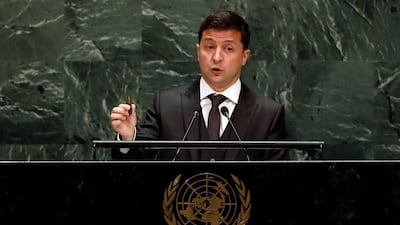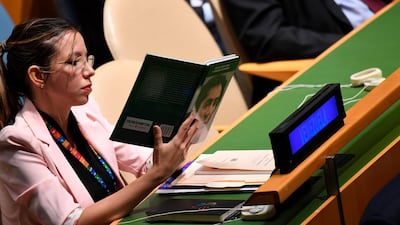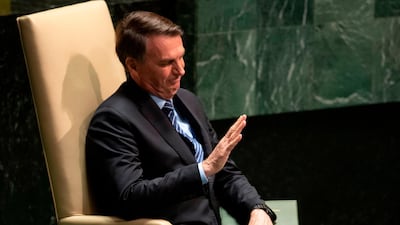Turkey’s president Recep Tayyip Erdogan used a series of photo props in an address to the UN General Assembly on Tuesday that challenged states to bring the Syrian conflict to an end and allow the displaced millions to return home.
Holding a map of Syria with a red line drawn across the top, Mr Erdogan demanded the establishment of a safe zone where two million Syrians could be resettled.
“We intend to establish a peace corridor with a depth of 30 kilometres and a length of 480 kilometres in Syria and enable the settlement of two million Syrians there with the support of the international community,” he said.
“With the US or the coalition forces, Russia and Iran, we can all together walk shoulder to shoulder, hand in hand - any refugees can be settled there.”
The Turkish leader declared his country was host to the biggest displaced population in the world and held up a photograph of the drowned infant Aylan Kurdi to provoke a reaction in the audience. The three year old died in September 2015 as his family joined Syrian refugees trying to reach Europe amid the refugee crisis
"This did not happen a long time ago but it has been forgotten already,” said Mr Erdogan. "Never forget it can happen to you.
"Turkey is the country hosting the largest number of displaced persons in the world," he said. "Syria has become a place that hurts the collective consign of humanity and a place of injustice.
"Half the population have been forced to live elsewhere."
Mr Erdogan was preceded at the podium by President Abdel Fattah El Sisi of Egypt who used his role as leader of the African Union (AU) to make an intervention on behalf of Sudan. In light of the installation of a new government and demise of the regime of Omar Al Bashir, Mr Al Sisi said Sudan should be removed from the UN terror lists, which would allow it to access international financial channels.
"I make a call to delete Sudan from the list of nations that are state sponsors of terrorism," he said. "Sudan should take the place it deserves among the international community.”
Extending the UN’s principles on sovereign states rights, Mr El Sisi said his leadership of the AU would pursue new co-operation to tap Africa’s economic potential.
“Respecting the ownership of national solutions to national problems is an imperative of the international system,” he said. “As the current chair of the African Union we have worked on the principle of African solution to African problems.”
He said a new AU mechanism based in Cairo would promote post-conflict reconstruction in the continent’s hotspot.
The Egyptian leader warned of the effect of escalation in the Arabian Gulf and called on the member states to come together to reduce tensions this week.







